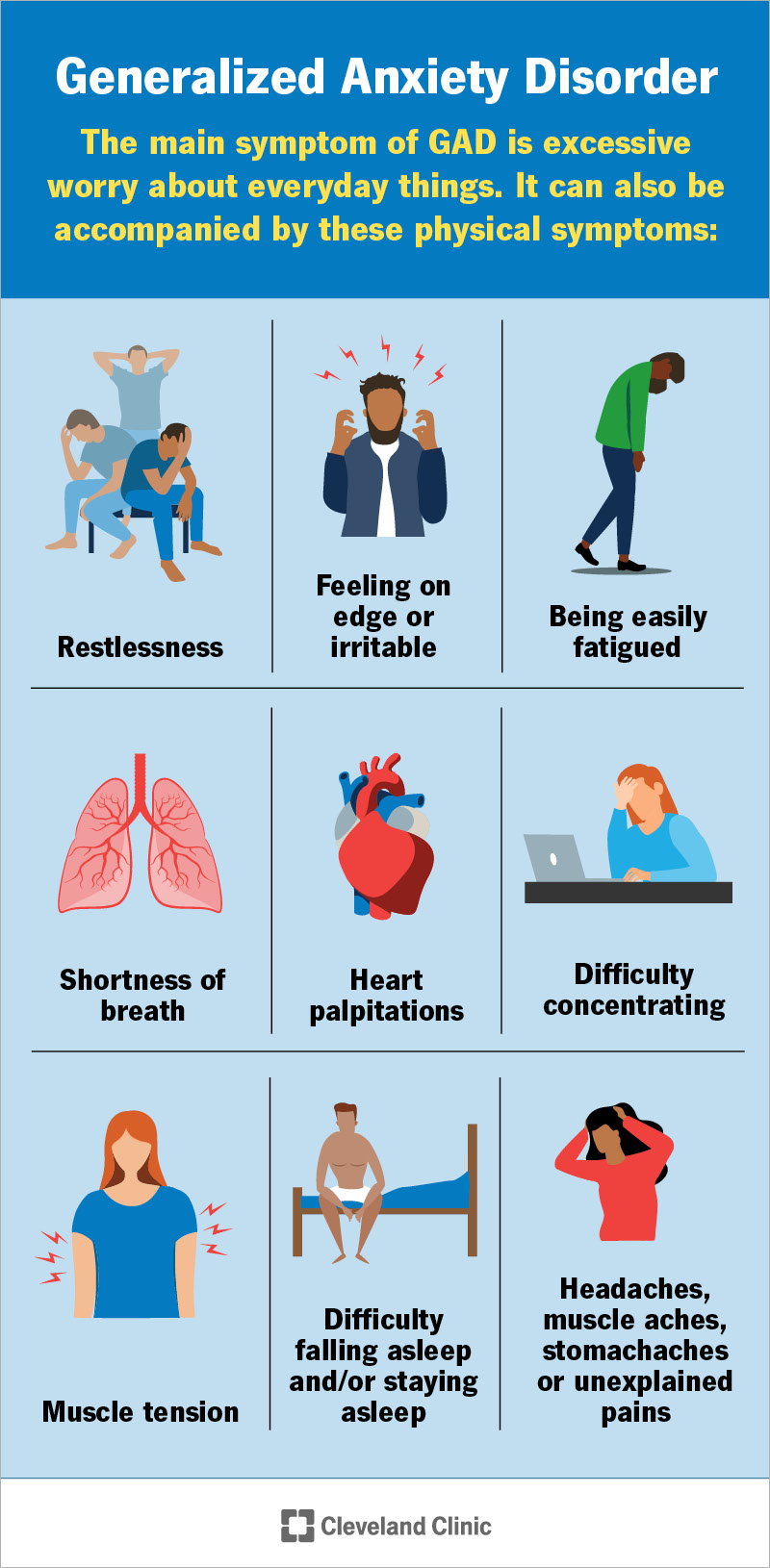Generalized anxiety disorder (GAD) is a mental health condition that causes fear, a constant feeling of being overwhelmed and excessive worry about everyday things. It can affect children and adults, and is manageable with talk therapy and/or medications.
Generalized anxiety disorder (GAD) is a mental health condition that causes fear, worry and a constant feeling of being overwhelmed. It’s characterized by excessive, frequent and unrealistic worry about everyday things, such as job responsibilities, health or chores. It can affect children and adults.
GAD is one of several anxiety disorders.
Most people with GAD have one or more other psychiatric conditions, including:
Advertisement
Cleveland Clinic is a non-profit academic medical center. Advertising on our site helps support our mission. We do not endorse non-Cleveland Clinic products or services. Policy
Generalized anxiety disorder can affect children and adults. The condition often begins in childhood or adolescence but may begin at any age.
Women and people assigned female at birth are twice as likely to be affected by GAD as men and people assigned male at birth.
Generalized anxiety disorder is common. It affects about 3% of the adult population.
Childhood anxiety occurs in about 1 in 4 children at some time between the ages of 13 years and 18 years. However, the lifetime prevalence of a severe anxiety disorder in children ages 13 to 18 is approximately 6%.
Advertisement

The main symptom of generalized anxiety disorder is excessive and persistent worry about everyday things. This persistent feeling of anxiety or dread interferes with how you live your life.
People with GAD have trouble controlling their worries or feelings of nervousness and often know that they worry much more than they should.
Symptoms of GAD may fluctuate over time and are often worse during times of stress.
This ongoing worry and tension may be accompanied by physical symptoms, including:
It’s important to note that occasional anxiety or worry is a normal part of life. Many people may worry about things such as health, financial issues or family problems. But people with GAD feel extremely worried or nervous more frequently about these and other things — even when there’s little or no reason to be concerned about them.
Researchers don’t know the exact cause of GAD, but they think it’s a complex combination of genetic, biological and environmental factors.
You’re more likely to have GAD if you have a first-degree biological relative (sibling or parent) with it.
Several areas of your brain and biological processes play a key role in fear and anxiety. Researchers are still learning more about these complex processes.
Researchers have also found that the following environmental factors may put you at higher risk for developing GAD:
Advertisement
Healthcare providers and mental health professionals use the criteria in the Diagnostic and Statistical Manual of Mental Disorders to diagnose generalized anxiety disorder.
The criteria include:
The anxiety is also associated with three or more of the following symptoms for at least six months:
If you think you or your child has GAD, it’s important to talk to a healthcare provider or a mental health professional, such as a psychologist.
A healthcare provider will perform a physical exam and may order some tests to make sure there are no physical medical conditions or substances that are causing your symptoms. These tests may include:
Generalized anxiety disorder is generally treated with psychotherapy (talk therapy), medication or both.
Psychotherapy, also called talk therapy, is a term for a variety of treatment techniques that aim to help a person identify and change unhealthy emotions, thoughts and behaviors.
Psychotherapy takes place with a trained, licensed mental health professional, such as a psychologist or psychiatrist. It can provide support, education and guidance to you and/or your family to help you function better and increase your well-being.
Mental health professionals most often use cognitive behavioral therapy (CBT) specifically to help treat GAD. During CBT, your mental health professional helps you take a close look at your thoughts and emotions. You’ll come to understand how your thoughts and excessive worrying affect your actions. Through CBT, you can unlearn negative or worrying thoughts and behaviors and learn to adopt healthier thinking patterns and habits.
Your healthcare provider or psychiatrist may prescribe medication to treat GAD. Different types of medication include:
There’s no known way to prevent generalized anxiety disorder, but many of its symptoms can be lessened with treatment. Seeking help as soon as symptoms appear can help decrease the disruptions to your life.
The prognosis (outlook) for generalized anxiety disorder can vary depending on how severe it is. In some cases, GAD is long-term (chronic) and difficult to treat. However, most people experience improvement in their symptoms with medicine and/or talk therapy.
If you have generalized anxiety disorder, aside from getting medical treatment, there are some things you can do to help manage the condition, including:
If you’ve been diagnosed with generalized anxiety disorder, you’ll need to see your healthcare provider regularly if you’re taking medication for it to make sure the dosage is working for you. If you experience any concerning symptoms or side effects, talk to your provider.
If you’re seeing a mental health professional to help treat GAD, be sure to attend all of your sessions and reschedule any you have to cancel. Although it can take time to see the effects of therapy, it’s important to keep going.
A note from Cleveland Clinic
Generalized anxiety disorder (GAD) can make it difficult to get through the day. The good news is that several effective anxiety treatments are available, including talk therapy and medications. Talk to your healthcare provider to figure out your diagnosis and the best treatment plan.
Last reviewed on 08/03/2022.
Learn more about the Health Library and our editorial process.
Advertisement
Cleveland Clinic is a non-profit academic medical center. Advertising on our site helps support our mission. We do not endorse non-Cleveland Clinic products or services. Policy